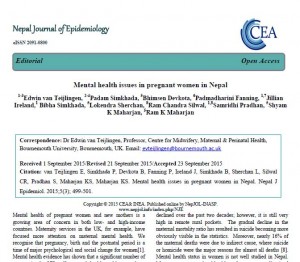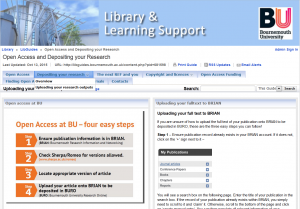 The current issue of the Nepal Journal of Epidemiology published today carries an editorial by a BU-led team of researchers and development workers. The editorial Mental health issues in pregnant women in Nepal highlights the intervention funded by THET which aims to improve the knowledge and attitude of maternity care workers in a rural district in the south of Nepal. The BU authors include Visiting Faculty: Padam Simkhada, Samridhi Pradham, Jillian Ireland and Bibha Simkhada, the other co-authors are affiliated with the charity we work with in Nepal (Ram Chandra Silwal), the Buddhist charity based in London Green Tara Trust (Padmadharini Fanning), and our Tribhuvan University based colleagues (Lokendra Sherchan, Shyam K Maharjan, and Ram K Maharjan.
The current issue of the Nepal Journal of Epidemiology published today carries an editorial by a BU-led team of researchers and development workers. The editorial Mental health issues in pregnant women in Nepal highlights the intervention funded by THET which aims to improve the knowledge and attitude of maternity care workers in a rural district in the south of Nepal. The BU authors include Visiting Faculty: Padam Simkhada, Samridhi Pradham, Jillian Ireland and Bibha Simkhada, the other co-authors are affiliated with the charity we work with in Nepal (Ram Chandra Silwal), the Buddhist charity based in London Green Tara Trust (Padmadharini Fanning), and our Tribhuvan University based colleagues (Lokendra Sherchan, Shyam K Maharjan, and Ram K Maharjan.
 This THET-funded project will involve over 15 UK short-term volunteers. It is important to bring UK volunteers, who as health professionals will bring their experience of, and training in, the provision of mental health and maternity/midwifery services including the area of mental ill health prevention and health promotion. These experienced health workers (such as midwives, family doctors, mental health nurses, health visitors, psychiatrists) from the UK are invited to volunteer for two to three weeks at a time to design and deliver training. The mixture of training staff abroad (= Education) by UK professionals (=Practice) through an intervention which is properly evaluated (=Research) is a perfect example of BU’s FUSION in action.
This THET-funded project will involve over 15 UK short-term volunteers. It is important to bring UK volunteers, who as health professionals will bring their experience of, and training in, the provision of mental health and maternity/midwifery services including the area of mental ill health prevention and health promotion. These experienced health workers (such as midwives, family doctors, mental health nurses, health visitors, psychiatrists) from the UK are invited to volunteer for two to three weeks at a time to design and deliver training. The mixture of training staff abroad (= Education) by UK professionals (=Practice) through an intervention which is properly evaluated (=Research) is a perfect example of BU’s FUSION in action.

This project is supported by the Tropical Health & Education Trust (THET) as part of the Health Partnership Scheme, which is funded by the UK Department for International Development (DFID) and runs from this year May 1st until the autumn of 2016. The paper is freely available on line, click here!
Prof. Edwin van Teijlingen
CMMPH
Refererence:
van Teijlingen E, Simkhada P, Devkota B, Fanning P, Ireland J, Simkhada B, Sherchan L, Silwal CR, Pradhan S, Maharjan KS, Maharjan KS. Mental health issues in pregnant women in Nepal. Nepal J Epidemiol. 2015;5(3); 499-501.



 ong committee; d) resource constraints; and e) assumption that non-clinical research are exempted, which are of course overlap and interact each other, for not applying ethical approval in low income countries. They have also provided examples of ethical approval taken from other countries than the host countries and further go on to stress that junior researchers and students should be encouraged to be familiar with research ethical approval. In their paper, they encourage journal editors and peer reviewers to ensure ethical approval bein
ong committee; d) resource constraints; and e) assumption that non-clinical research are exempted, which are of course overlap and interact each other, for not applying ethical approval in low income countries. They have also provided examples of ethical approval taken from other countries than the host countries and further go on to stress that junior researchers and students should be encouraged to be familiar with research ethical approval. In their paper, they encourage journal editors and peer reviewers to ensure ethical approval bein g granted for manuscripts based on empirical studies. This paper was co-authored by BU visiting faculty Professor Padam Simkhada and recently published in Nepal Journal of Epidemiology. The paper is freely available through the journal’s website
g granted for manuscripts based on empirical studies. This paper was co-authored by BU visiting faculty Professor Padam Simkhada and recently published in Nepal Journal of Epidemiology. The paper is freely available through the journal’s website 














 SPROUT: From Sustainable Research to Sustainable Research Lives
SPROUT: From Sustainable Research to Sustainable Research Lives BRIAN upgrade and new look
BRIAN upgrade and new look Seeing the fruits of your labour in Bangladesh
Seeing the fruits of your labour in Bangladesh Exploring Embodied Research: Body Map Storytelling Workshop & Research Seminar
Exploring Embodied Research: Body Map Storytelling Workshop & Research Seminar Marking a Milestone: The Swash Channel Wreck Book Launch
Marking a Milestone: The Swash Channel Wreck Book Launch ECR Funding Open Call: Research Culture & Community Grant – Application Deadline Friday 12 December
ECR Funding Open Call: Research Culture & Community Grant – Application Deadline Friday 12 December MSCA Postdoctoral Fellowships 2025 Call
MSCA Postdoctoral Fellowships 2025 Call ERC Advanced Grant 2025 Webinar
ERC Advanced Grant 2025 Webinar Update on UKRO services
Update on UKRO services European research project exploring use of ‘virtual twins’ to better manage metabolic associated fatty liver disease
European research project exploring use of ‘virtual twins’ to better manage metabolic associated fatty liver disease